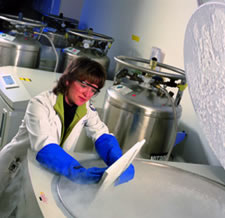Definition

Hematopoietic stem cells are the "parent" blood cells that produce white cells to fight infection, platelets to allow the blood to clot normally, red cells to carry oxygen to tissue and lymphocytes which make up the immune system of the body. Stem cells are found in umbilical cord blood, bone marrow and in blood after administration of growth factors. This tissue, ordinarily discarded at birth, can be collected made available for transplantation.
Stem cells can be used in the treatment of cancer and other life threatening illnesses along with high doses of chemotherapy and radiation. The immune cells from the stem cell transplant act to prevent the cancer from spreading.
Cord blood transplants are used to treat many life-threatening diseases including:
- Acute and chronic leukemias
- Hodgkin's and Non-Hodgkin's Lymphomas
- Sickle cell anemia
- Immune deficiency states
- Certain genetic diseases
- Myeloma
For allogeneic transplantation, it is preferable to identify a matched donor from a brother or sister. Unfortunately, many individuals in need of a transplant do not have a match within the family. In those cases, adult blood or marrow stem cells can be obtained through the National Marrow Donor Program or more recently, from cord blood tissue banks.
The advantages of cord blood are that it is quickly available and requires less stringent matching than bone marrow transplant. Cord blood transplants are especially useful for children and adults of small size
Cord Blood Donation
During cord blood donation, the umbilical cord is clamped after the baby's birth, breaking the link between the baby and the placenta. This process does not harm the baby because the cord blood is collected from the placenta after delivery and would normally be discarded. The small amount of blood remaining in the umbilical cord, typically three to five ounces, is drained and taken to a cord blood bank where it is frozen. The stem cells in frozen cord blood remain available for transplantation for many years. The baby's mother must agree, on behalf of her child, to the collection and storage of the cord blood for possible transplantation.
Transplantation
A successful transplant requires the patient to be healthy enough to undergo the rigors of the transplant procedure. Age, general physical condition, the patient's diagnosis and the stage of the disease are all considered by the physician when determining whether a person should undergo a transplant.
Procedure
A patient admitted to the UF Health blood and bone marrow transplant unit will undergo several days of chemotherapy or radiation to destroy cancerous cells and make room for the new healthy cells. Patients receive the stem cells intravenously a few days after their treatments.
Early Follow-Up Care
The most critical time for the patient is two to four weeks after the transplant. The high-dose chemotherapy or radiation given to the patient before the transplant to destroy the cancer also cripples the body's blood production and immune system. As the patient waits for the transplanted cells to migrate to the cavities of the large bones and replenish the blood and bolster the immune system, he or she is very susceptible to infection and excessive bleeding. Extraordinary precautions are taken to minimize the patient's exposure to viruses, bacteria and fungi. A patient usually spends the first several weeks after the transplant in the hospital.
Long-Term Care
After leaving the hospital, a patient continues recovering at home. It usually takes up to six months for patients to return to full-time work after a transplant.
It can take up to a year for the new stem cells and immune system to function normally. Patients are closely monitored during this time to identify any infections or complications.
The UF Health Difference
The UF Health Blood and Marrow Transplant and Leukemia Service of the UF Health Shands Cancer Center uses a multidisciplinary team approach to patient care that optimizes patient outcomes and satisfaction.
In 1998, UF Health, LifeSouth Community Blood Centers and UF formed a cord blood bank in Gainesville, Florida. The cord blood bank is accredited by Foundation for Accreditation of Hematopoietic Cell Transplantation (FAHCT) and the American Association of Blood Banks, and has been approved as one of only five. Cord Blood Banks as part of the National Marrow Donor Program. A variety of research projects to improve our understanding of cord blood stem cells are underway.
The UF Health Blood and Marrow Transplant Program, Florida's oldest program established in 1981, has performed more than 1,300 blood and marrow transplants. The program is one of the largest in the Southeast.
Our medical firsts include:
- 2000: Florida's first pediatric placenta/umbilical cord blood transplant for sickle cell anemia
- 2000: Florida's first cord blood bank to be accredited by FAHCT
- 1997: Florida's first mini bone marrow transplant for lymphoma
- 1996: Florida's first adult placenta/umbilical cord blood transplant for leukemia
- 1995: Florida's first pediatric placenta/umbilical cord blood transplant for leukemia
- 1995: Nation's third and Southeast's first placenta/umbilical cord blood bank
- 1983: Florida's first pediatric bone marrow transplant

Team
John R. Wingard, M.D.
UF College of Medicine professor of Hematology and Oncology, medical director of the UF Health Bone Marrow Transplant program and UF Health Shands Cancer Center associate director of clinical and translational research
 John Graham-Pole, M.D.
John Graham-Pole, M.D.
UF College of Medicine associate professor of Hematology and Oncology
UF College of Medicine professor of Pediatric Hematology and Oncology, affiliate professor of Department of Clinical and Health Psychology and medical director of UF Health Arts in Medicine
Amos Kedar, M.D.
UF College of Medicine associate professor of Hematology and Oncology
Information
If you are interested in more information on the treatment programs and options offered by physicians practicing at UF Health, you are invited to fill out and submit the following form.

 Hematopoietic stem cells are the "parent" blood cells that produce white cells to fight infection, platelets to allow the blood to clot normally, red cells to carry oxygen to tissue and lymphocytes which make up the immune system of the body. Stem cells are found in umbilical cord blood, bone marrow and in blood after administration of growth factors. This tissue, ordinarily discarded at birth, can be collected made available for transplantation.
Stem cells can be used in the treatment of cancer and other life threatening illnesses along with high doses of chemotherapy and radiation. The immune cells from the stem cell transplant act to prevent the cancer from spreading.
Cord blood transplants are used to treat many life-threatening diseases including:
Hematopoietic stem cells are the "parent" blood cells that produce white cells to fight infection, platelets to allow the blood to clot normally, red cells to carry oxygen to tissue and lymphocytes which make up the immune system of the body. Stem cells are found in umbilical cord blood, bone marrow and in blood after administration of growth factors. This tissue, ordinarily discarded at birth, can be collected made available for transplantation.
Stem cells can be used in the treatment of cancer and other life threatening illnesses along with high doses of chemotherapy and radiation. The immune cells from the stem cell transplant act to prevent the cancer from spreading.
Cord blood transplants are used to treat many life-threatening diseases including:

 John Graham-Pole, M.D.
John Graham-Pole, M.D.